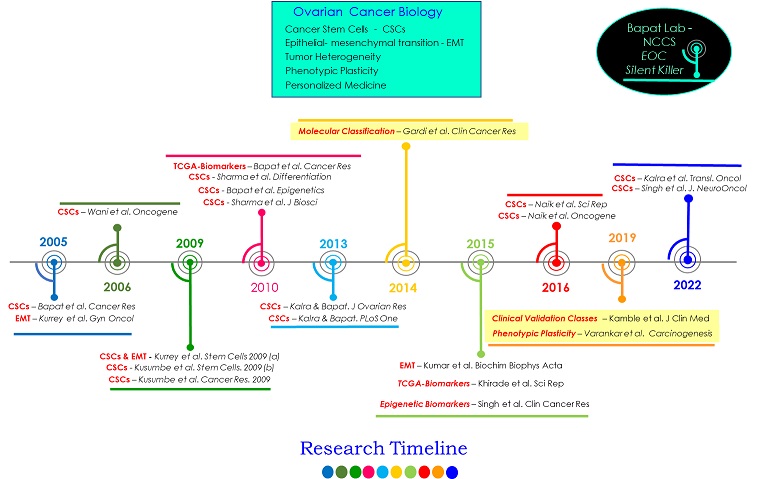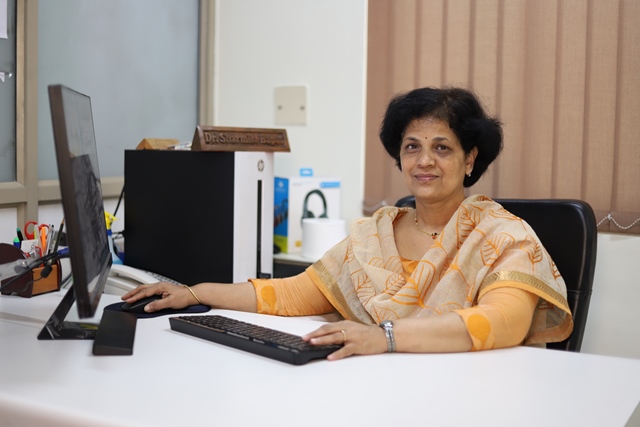
Sharmila Bapat, Ph.D.
The research theme in my lab relates to elucidation of cellular and molecular pathways underlying ovarian cancer.sabapat@nccs.res.in
Research Areas
Biology of Cancer and chronic Diseases, Genome Architecture and Regulation
Education and Experience
2024-present, Director, Additional Charge, National Centre for Cell Sciences, Pune, India
2001-present, Principal Investigator, National Centre for Cell Sciences, Pune, India
1987-1992, Ph.D (Biochemistry), Pune University
1985-1987, M.Sc (Microbiology), Pune University
Research
We have several achievements in the field including -
-
Identification of quiescent, regenerative human ovarian cancer stem cells (CSCs) through development of unique experimental models, self-renewal assays with stemness-specific molecular correlates, and resolving CSC-niche interactions to study the associations with neo-angiogenesis, aneuploidy and tumor dormancy.
-
Demonstration that the Epithelial to Mesenchymal Transition (EMT) transcription factors Snail and Slug, which mediate tissue homeostasis following wound healing of normal ovarian surface epithelia, are harnessed for metastatic dissemination in HGSC.
-
A fortuitous study of the intersection of these two phenomena (CSCs and EMT) uniquely revealed that the stress-triggered, non-canonical modulation of EMT leads to CSC enrichment and resistance to p53-mediated apoptosis.
-
Resolution of intra-tumor heterogeneity as discrete cell fractions reflecting on CSC hierarchies, genetic instability and differential cell cycling. This identified residual regenerative end-points based on tumor cell dynamics with improved application in drug screening and identification of drug recalcitrance/resistance over conventional evaluation of tumor volumes following drug exposure.
-
Resolution of inter-tumor heterogeneity vis-à-vis identification of discrete molecular HGSC tumor classes, each with unique regulatory networks, pathways and modes of metastases. Clinical validation of these further revealed transcriptional heterogeneity mediating class-switching (cellular plasticity) following chemotherapy.
-
A deeper molecular understanding of the clinically identified tumor cell plasticity identified auto- and cross-regulation of Slug by TCF21. These transcription factors map an epithelial (E) to mesenchymal (M) gradient in HGSC, comprising of E, intermediate E, E-M hybrid, intermediate M, and M phenotypes, which correlate with the clinical findings. Modelling this gradient in vitro achieved a salient comprehension of differential migratory modes (cooperative cell migration and EMT) along the E to M axis, which reflects on the various molecular cross-talks mediating tumor cell survival and drug resistance.
-
Development of a cytotoxic monoclonal antibody specific for the EMT tumor subtype of HGSC.
Our efforts in elucidating the basic biology and regulatory mechanisms in this disease has revealed tumors as dynamically evolving systems that continuously acquire phenotypic, cellular, molecular and functional heterogeneity.
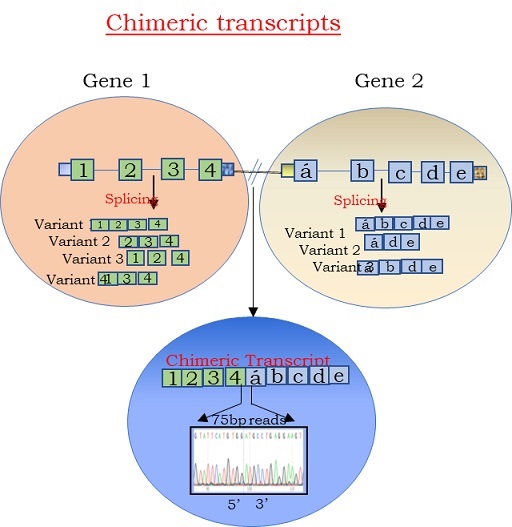
Our current research is very exciting and relates to the identification of chimeric transcripts in ovarian cancer. These represent non-canonical flow of genetic information that remains unexplored in view of molecular diversity that could contribute to definitive cellular functions and therapy in the case of cancer.
We are currently being studied for their role in regulating cellular functions. Using a customized peptide database and a pipeline for their detection, we have been able to identify several chimeric proteins, which are being studied further. Some of these potentially generate antigenic neoepitopes that is exciting since such neoantigens may be targeted through immunotherapy.
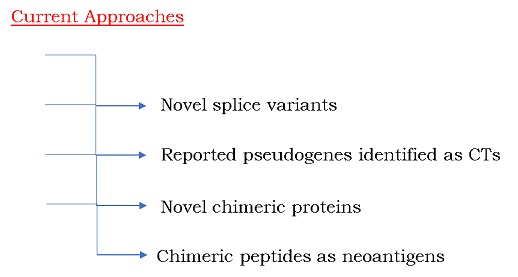
Publications - as Group Leader at NCCS
Publications Patents Books and Book Chapters
Publications (As Group Leader at NCCS)
- Narayanan A, More AS, Talreja M, Mali AM, Vinay SB, Bapat SA. A novel ITGB8 transcript variant sustains ovarian cancer cell survival through genomic instability and altered ploidy on a mutant p53 background. Journal of Ovarian Research, Manuscript accepted 18th October 2024 ; doi:10.1186/s13048-024-01538-6.
- Verma S, Dalabehera S, Maurya R, Singh D, Prasher B, Pandey R, Bapat S, Ramalingam S, Sachidanandan C. Generation of an induced pluripotent stem cell line IGIBi18-A from an Indian patient with Rubinstein Taybi Syndrome. Stem Cell Res. 2024 Aug;78:103456.
- Shridhar A, More AS, Jadhav AR, Patil K, Mavlankar A, Dixit VM, Bapat SA. Comput Struct Biotechnol J. 2023; 21:5153-5164. doi: 10.1016/j.csbj.2023.10.028.
- Shivalingappa PKM, Singh DK, Sharma V, Arora V, Shiras A, Bapat SA. RBM47 is an important regulator of mouse embryonic stem cell differentiation. Stem Cell Rev Rep. 2023 Feb;19(2):475-490. doi: 10.1007/s12015-022-10441-w. Epub 2022 Aug 20.
- More MH, Varankar SS, Naik RR, Dhake RD, Ray P, Bankar RM, Mali AM, Subbalakshmi AR, Chakraborty P, Jolly MK, Bapat SA. A Multistep Tumor Growth Model of High Grade Serous Ovarian Carcinoma Identifies Hypoxia Associated Signatures. Cells Tissues Organs. 2022 Aug 15. doi: 10.1159/000526432. Online ahead of print.
- Mishra P, Jadhav AR, Bapat SA. Single cell sequencing: A cutting edge tool in molecular medical research. Med J Armed Forces India. 2022 Sep;78(Suppl 1):S7-S13.
- Varankar SS, Hari K, Bapat SA*, Jolly MK*. Cell Geometry Distinguishes Migration-Associated Heterogeneity in Two-Dimensional Systems. Comput Syst Oncol. 2022;2:e1041; * - co-communicating authors.
- Singh DK, Shivalingappa PKM, Sharma A, Mondal A, Muzumdar D, Shiras A, Bapat SA - NSG-70, a new glioblastoma cell line with mixed proneural-mesenchymal features associates NOTCH1-WNT5A signaling with stem cell maintenance and angiogenesis. J Neuro-Oncology 2022 May;157(3):575-591.
- Kalra RS, Soman GS, Naik RR, Varankar SS, Kamble SC, Mali AM, Parab PB, Bapat SA. A Monoclonal Antibody against Annexin II targets stem and progenitor cell fractions in tumors. Transl Oncol. 2022 Jan;15(1):101257.
- Shivalingappa PKM, Sharma V, Shiras A, Bapat SA. RNA Binding Motif 47 (RBM47): Emerging Roles in Vertebrate Development, RNA Editing and Cancer. Mol Cell Biochem. 2021;476(12):4493-4505.
- Varankar SS, More MM, Abraham A, Kumar B, Narayanan NJ, Jolly MK, Bapat SA - Functional Balance between TCF21-Slug defines phenotypic plasticity and migratory modalities in high-grade serous ovarian cancer cell lines; Carcinogenesis. 2020;41(4):515-526.
- Varankar SS, Bapat SA. Uncoupling Traditional Functionalities of Metastasis: The Parting of Ways with Real-Time Assays. J Clin Med. 2019;8(7). pii: E941.
- Kamble SC, Sen A, Dhake RD, Joshi AN, Midha D, Bapat SA. Clinical Stratification of High-Grade Ovarian Serous Carcinoma Using a Panel of Six Biomarkers. J Clin Med. 2019;8(3). pii: E330. doi: 10.3390/jcm8030330.
- Jolly MK, Somarelli JA, Sheth M, Biddle A, Tripathi SC, Armstrong AJ, Hanash SM, Bapat SA, Rangarajan A, Levine H. Hybrid epithelial/mesenchymal phenotypes promote metastasis and therapy resistance across carcinomas. Pharmacol Ther. 2019;194:161-184.
- Varankar SS, Bapat SA. Migratory Metrics of Wound Healing: A Quantification Approach for in vitro Scratch Assays. Front Oncol. 2018;8:633.
- Naik RR, Luo T, Kohandel M, Bapat SA. Tumor deconstruction as a tool for advanced drug screening and repositioning. Pharmacol Res., 2016; 111: 815-9.
- Naik RR, Gardi NL, Bapat SA. Elucidation of molecular and functional heterogeneity through differential expression network analyses of discrete tumor subsets. Scientific Reports. 2016; 6: 25261.
- Naik RR, Singh AK, Mali AM, Khirade MF, Bapat SA. A tumor deconstruction platform identifies definitive end-points in the evaluation of drug responses, Oncogene 2016; 35:727-37.
- Khirade MF, Lal G, Bapat SA., Derivation of a fifteen gene prognostic panel for six cancers., Scientific Reports. 2015; 5: 13248.
- Kumar B, Uppuladinne MVN, Jani V, Sonavane U, Joshi RR, Bapat SA. Auto-regulation of SNAI2 mediates its activity during epithelial to mesenchymal transition. Biochimica et Biophysica Acta (BBA) - Gene Regulatory Mechanisms, 2015; 1849: 1209-1219.
- Singh AK, Chandra N, Bapat SA. Evaluation of epigenetic drug targeting of heterogenous tumor cell fractions using potential biomarkers of response in ovarian cancer. Clinical Cancer Research, 2015; 21: 5151–63.
- Dong Y, Batra J, Kamal A, Bapat S, Clements JA. Transforming the Future of Treatment for Ovarian Cancer. Clinical Experimental Pharmacology, 2014; 4:2-9
- Gardi NL, Deshpande TU, Kamble SC, Budhe SR, Bapat SA. Discrete molecular classes of ovarian cancer suggestive of unique mechanisms of transformation and metastases. Clinical Cancer Research, 2014,20:87-99.
- Kalra RS, Bapat SA. Expression Proteomics Predicts Loss of RXR-g during Progression of Epithelial Ovarian Cancer. PLoS One. 2013; 8:e70398.
- Kalra RS, Bapat SA. Enhanced levels of double-strand DNA break repair proteins protect ovarian cancer cells against genotoxic stress-induced apoptosis. J Ovarian Cancer. 2013; 6:66.
- Krishnaprasad H, Khadilkar A, Sharma N, Khadilkar V, Pfäffle R, Blum W, Bapat S. Entire prophet of Pit-1 (PROP-1) gene deletion in an Indian girl with combined pituitary hormone deficiencies. J Pediatr Endocr Met. 2011; 24:579–580.
- Bapat SA, Jin V, Berry N, Balch C, Sharma N, Kurrey N, Zhang S, Fang F, Lan X, Li M, Kennedy B, Bigsby RM, Huang T H-M, Nephew KP. Multivalent Epigenetic Marks Confer Microenvironment-Responsive Epigenetic Plasticity to Ovarian Cancer Cells. Epigenetics. 2010; 5:1-14.
- Bapat SA. Ovarian Cancer Stem Cells. Reproduction. 2010; 140:33-41.
- Bapat SA, Krishnan A, Ghanate AD, Kusumbe AP, Kalra RS. Gene Expression - Protein Interaction Systems Network Modeling identifies Transformation Associated Molecules and Pathways in Ovarian Cancer. Cancer Research. 2010;70:4809-19.
- Sharma N, Mali AM, Bapat SA. Spectrum of CREBBP mutations in Indian Rubinstein- Taybi Syndrome patients. J. Biosci. 2010;35:187-202.
- Sharma N, Jadhav SP, Bapat SA. CREBBP Re-Arrangements affect Protein Function and lead to aberrant Neuronal Differentiation. Differentiation 2010;79:218-31.
- Bapat S Modulation of Gene Expression in Ovarian Cancer by Active and Repressive Histone Marks. Epigenomics 2010;2:39–51.
- Kusumbe AP, Bapat SA. Cancer stem cells and aneuploid populations within developing tumors are the major determinants of tumor dormancy. Cancer Research. 2009;69:9245-53.
- Kurrey NK, Jalgaonkar SP, Joglekar AV, Ghanate AD, Chaskar PD, Doiphode RY, Bapat SA. Snail and Slug mediate radio- and chemo-resistance by antagonizing p53-mediated apoptosis and acquiring a stem-like phenotype in ovarian cancer cells. Stem Cells. 2009; 27:2059-2068.
- Kusumbe AP, Mali AM, Bapat SA. CD133 expressing Stem Cells associated with Ovarian Metastases establish an Endothelial Hierarchy and contribute to Tumor Vasculature. Stem Cells. 2009;27:498-508.
- Berry NB, Bapat SA. Ovarian cancer plasticity and epigenomics in the acquisition of a stem-like phenotype. J Ovarian Res. 2008;1:8.
- Wani AA, Rangrez AY, Kumar H, Bapat SA, Suresh CG, Barnabas S, Patole MS, Shouche YS. Analysis of reactive oxygen species and antioxidant defenses in complex I deficient patients revealed a specific increase in superoxide dismutase activity. Free Radic Res. 2008; 42:415-27.
- Wani AA, Ahanger SH, Bapat SA, Rangrez AY, Hingankar N, Suresh CG, Barnabas S, Patole MS, Shouche YS. Analysis of mitochondrial DNA sequences in childhood encephalomyopathies reveals new disease-associated variants. PLoS One. 2007; 2:e942.
- Balch C, Nephew KP, Huang TH, Bapat SA. Epigenetic "bivalently marked" process of cancer stem cell-driven tumorigenesis. Bioessays. 2007; 29:842-5.
- Bapat SA. Evolution of cancer stem cells. Semin Cancer Biol. 2007; 17:204-13.
- Wani AA, Sharma N, Shouche YS, Bapat SA. Nuclear-mitochondrial genomic profiling reveals a pattern of evolution in epithelial ovarian tumor stem cells. Oncogene. 2006; 25:6336-44.
- Bapat SA, Mishra GC. Stem cell pharmacogenomics: a reality check on stem cell therapy. Curr Opin Mol Ther. 2005; 7:551-6.
- Bapat SA, Mali AM, Koppikar CB, Kurrey NK. Stem and progenitor-like cells contribute to the aggressive behavior of human epithelial ovarian cancer. Cancer Research. 2005; 65:3025-9.
- Kurrey NK, K A, Bapat SA. Snail and Slug are major determinants of ovarian cancer invasiveness at the transcription level. Gynecol Oncol. 2005; 97:155-65.
- Bapat S, Galande S. Association by guilt: identification of DLX5 as a target for MeCP2 provides a molecular link between genomic imprinting and Rett syndrome. Bioessays. 2005; 27:676-80.
- Bapat SA, Mishra GC. Stem cell pharmacogenomics. Curr Top Med Chem. 2004; 4:1371-83.
Patents Sealed
- US Patent # 20170067901 (Granted) – “A Tumor Deconstruction Platform for the analysis of Intra-Tumor Heterogeneity”.
- Indian Patent # 358225 (Granted) - “A Tumor Deconstruction Platform for the analysis of Intra-Tumor Heterogeneity”.
- Indian Patent Granted – patent # 374150 - “A Monoclonal Antibody Targeting the Tumor Regenerative Hierarchy”.
- PCT: PCT/IB2015/050358 application filed “Identification, quantification, monitoring and analysis of intra-tumor heterogeneity”.
Books - Edited a book – “Cancer Stem Cells” (Publishers: John Wiley & Sons, Hoboken)
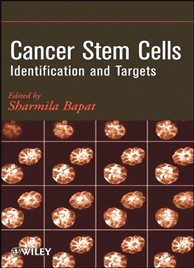 |
Sharmila A. Bapat (Editor) Hardcover  |
Book Chapters
- Bapat SA, Mishra GC. Pharmacogenomics Based Emerging Drug Discovery Strategies. In: Advances in Biochemistry and Biotechnology; Volume 1 Pages 245-280; 2005, Chakraborty C (Ed), Daya Publishing House, India.
- Sharmila Bapat, Anne Collins, Michael Dean, Kenneth Nephew, Suraiya Rasheed. Cancer Stem Cells (CSCs): Similarities and Variation of the Theme of Normal Stem Cells In : Cancer Stem Cells: Identification and targets; Pages 1-26; 2008, Bapat SA (Ed), John Wiley & Sons (Publishers)
- Sharmila Bapat. Leukemic Stem Cells. In: Cancer Stem Cells: Identification and targets; Pages 1-26; 2008, Bapat SA (Ed), John Wiley & Sons (Publishers).
- Anjali Kusumbe, Sharmila Bapat. Ovarian Stem Cell Biology and the emergence of Ovarian Cancer Stem Cells. In: Cancer Stem Cells: Identification and targets; Pages 1-26; 2008, Bapat SA (Ed), John Wiley & Sons (Publishers).
- Bapat SA. Stem Cells in Human Epithelial Ovarian Cancer. In: Stem cells: organogenesis and cancer, S.R. Singh & P.K. Mishra(Eds.), Research Signpost/ Transworld Research Network (Publishers), 2010.
- Balla MM, Kusumbe AP, Vemuganti GK, Bapat SA. Cancer Stem Cells. In: Regenerative Medicine, 2011, Gustav Steinhoff (Ed.), Springer Verlag Publishers.
- Bapat SA. Epigenetic Regulation of Cancer Stem Cells. In: Epigenetics: Development And Disease, 2011, Tapas. Kundu (Ed). Springer Verlag Publishers.
- Bapat S.A. (2013) Epigenetic Regulation of Cancer Stem Cell Gene Expression. In: Kundu T. (eds) Epigenetics: Development and Disease. Subcellular Biochemistry, vol 61. Springer, Dordrecht
- Bapat SA. Cancer Stem Cells. In: Regenerative Medicine, 2016, Gustav Steinhoff (Ed.), Springer Verlag Publishers.
- Bapat SA. (2016) Cancer Stem Cells: Perspectives Beyond Immunophenotypes and Markers. In: Steinhoff G. (eds) Regenerative Medicine - from Protocol to Patient. Springer, Cham.
- Panda Suchismita, Shiras A, Bapat SA. Long Noncoding RNAs: Insights into their roles in normal and Cancer Stem Cells, In: Cancer and Non-coding RNAs, 2016, Chakrabarti (Ed.), Elsevier Publishers.
- Suresh A., Naik R.R., Bapat S.A. (2017) Role of Cancer Stem Cells in Oral Cancer. In: Kuriakose M. (eds) Contemporary Oral Oncology, Springer, Cham.
- Bapat SA. (2018) Tumor-Initiating Cells in Ovarian Cancer. In: Katabuchi H., Ohba T., Motohara T. (eds) Cell Biology of the Ovary. Springer, Singapore.
- Kalra Rajkumar S, Bapat SA (2019). Proteomics to Predict Loss of RXR-γ During Progression of Epithelial Ovarian Cancer. In: Ray Swapan K. (eds) Methods Molecular Biology. 978-1-4939-9584-4.
Awards, Honours and Memberships
Academic Appointments
2022-2025 Appointed Chairperson, Cancer Biology Task Force, Department of Biotechnology
2022-2025 Appointed Chief Vigilance Officer, National Centre for Cell Science, Pune
2019-2021 Appointed Member of the Council, Indian Academy of Sciences, Bangalore
2019-2022 Appointed Member of the Board of Governors, National Institute of Technology, A.P
2018- present External Member, Board of Studies, Homi Bhabha National Insitute (HBNI University)
2018-present Member, CSIR-HRDG Medical Sciences Research Committee
2016-2018 Invited Member, AACR (American Association of Cancer Research) Advisory Sub-comittee on India
2019-2021 Elected member of Executive Committee of the Indian Association of Cancer Research (IACR)
2018 Member, Rapid Action Plan and Scientific Advisory Committee of the National Institute of Immunology, New Delhi
2012-2015 Elected member of Executive Committee of the Indian Association of Cancer Research (IACR)
2012-2014 Member, Task Force on Basic Biology of the Department of Biotechnology
2011-2016 Member of Board of Studies in Stem Cells & Regenerative Medicine, D.Y.Patil University, Kolhapur
2010-2011 Member, Rapid Action Plan and Scientific Advisory Committee of the National Institute of Immunology, New Delhi
2009-2015 Member of Board of Studies in Stem Cells & Tissue Engineering, Panjab University, Chandigarh
2009-2012 Elected member of Executive Committee of the Indian Association of Cancer Research (IACR)
2009-2012 Member, Task Force on Chronic Disease Biology of the Department of Biotechnology
2007- 2010 Member, Task Force for screening research grants under the call for Indo-German forum of the Indian Council for Medical Research
2001-present Scientist, National Centre for Cell Science, Pune, INDIA
1997-2000 Faculty in Microbiology, Pune University, INDIA
1994-1996 Industrial Experience, Global Environmental Engineering Ltd. Pune, INDIA
1992-1993 Post-Doctoral Fellow, National Facility for Animal Cell and Tissue Culture, Pune, INDIA
Honours and Awards
2025 Awarded the M. G. Oration on 16th January, 2025 at the 44th Annual Meeting of the Indian Association for Cancer Research (IACR) at Kolkata.
2023 Shri Ramniklal J. Kinarivala Cancer Research Award, Gujarat Cancer Society
2019–2020 Short Term ICMR-DHR International Fellowship for Senior Indian Biomedical Scientists
2020 Miltenyi Biotech Project Grants 2020
2017-2022 TATA Innovation Fellowship from the Department of Biotechnology
2016 Outreach Lecturing Fund (OLF) Award of the USIEF for travel, lecturing and developing linkages with US Universities
2016 $10,000 virtual cloud credits from the Seven Bridges Cancer Genomics Cloud for continued use of their platforms after return to India on completion of sabbatical
2015 Elected Fellow of the Indian Academy of Sciences, Bangalore
2015 Elected Fellow of the Maharashtra Academy of Sciences, Pune
2015 Group Award from The Cytometry Society, India, for novel applications of flow cytometry
2015 Fullbright (FNAPE) Fellowship
2010 Elected Fellow of the National Academy of Sciences, Allahabad
2010 R.M. Tiwari Research Oration Award
2008 National Woman Bioscientist Award from the Department of Biotechnology
2008 Prem Nath Wahi Award from the Indian Council for Medical Research
2006 Department of Biotechnology Overseas Fellowship availed at Indiana University, Bloomington, Indiana, US
2005 Department of Biotechnology International Travel Award
2000 CSIR Pool Scientist Award
1997-2000 CSIR Research Associate Fellowship
1992-1993 Post-doctoral Fellowship at National Facility for Animal Cell and Tissue Culture
1987-92 Council of Scientific and Industrial Research Fellowship
1980-87 Maharashtra State Fellowship for undergraduate and post-graduate education and research
Professional Memberships
Elected as a Member of the Indian Academy of Sciences, Bengaluru for the triennium 2025–2027.
Appointed as Member of Indian Cancer Genome Atlas (ICGA).
Nominated as member for Local Research Advisory Committee (LRAC) of AFMC, Pune.
Elected Member of the Council of Indian Academy of Sciences (2019 – 2022)
Nominated Member of the Board of Governers of the National Institute of Technology, A.P (2019 – 2022)
Elected Member of the Guha Research Conference
Life Member of Indian Association of Cancer Research (IACR).
Life Member of Indian Society of Cell Biology (ISCB).
Member- International Epigenetics Society
Life Member of Indian Women Scientists Association.
Life Member of International Federation of Head and Neck Oncology (Honorary Membership received)
Editorial Board Member of the journals – Journal of Ovarian Research, Scientific Reports
Talks / Invited Lectures
(2018 – 2020)
Invited Lectures
Symposia / Workshops Organised
-
2-day Science Academies Lecture workshop on ‘Advances in Cancer Biology’ convened at Sri Ram Narayan Kedia Government Degree College, Desaipet, Banswada, Telangana, on February 27th–28th, 2018.
-
One-day symposium on “Stem Cells & Cancer – India 2018” at Somaiya Vidyavihar Campus, Mumbai on 5th February, 2018 on behalf of NCCS, along with Sathgen Biotech, Mumbai.
-
Public talk of Prof. Michael Clarke titled ‘Molecular Regulation of normal and malignant stem cells’ at NCCS, Pune on 6th February, 2018.
-
NCCS Retreat on 26th – 27th September, 2018 for staff, students and faculty of NCCS at Lonavala.
-
Organised One-day Indo-Australian symposium on “Epithelial to Mesenchymal Transition” at NCCS on 24th October, 2018 in collaboration with Queensland University of Technology (QUT), Brisbane, Australia and Institute for Bioinformatics (IOB), Bangalore, India; funded by the Australia India Council.
-
Organised One-day symposium on “Stem Cells & Cancer – India 2018” at Somaiya Vidyavihar Campus, Mumbai on 1st February, 2019 on behalf of NCCS, along with Sathgen Biotech, Mumbai.
Talks / Invited Lectures (2017 – 2021)
-
“Cancer Stem cells in tumor heterogeneity : therapeutic implications” at “Oral Cancer Science Symposium”, held during the 6th World Oral Cancer Congress of the International Academy of Oral Oncology (IAOO) at Bangalore, India
-
“Phenotypic plasticity along the Epithelial-Mesenchymal Axis in ovarian cancer” at one-day symposium “Epithelial-Mesenchymal Transition – New Advances in Cancer Development” at IISC, Bangalore on 6th October, 2017
-
“Cellular Phenotypes in Cancer” -.White board talk at Guha Research Council meeting Phenotypic plasticity along the Epithelial-Mesenchymal Axis in ovarian cancer at the 8th Int. EMT meeting (TEMTIA) at MD Anderson Cancer Centre, Houston, US
-
‘Science for human welfare’, and ‘Recent Concepts in Cancer Biology’. 2 talks at ASM’s CSIT, Junior College in Pimpri
-
“Cancer Metastases” at the ICMR funded ROME workshop for clinical and medical practitioners conducted by the Moving Academy of Medicine.
-
‘Cancer Development, Drug Resistance and Cancer Stem Cells’ and ‘Cancer Metastases’ – 2 talks at Sri Ram Narayan Kedia Government Degree College, Desaipet, Banswada, Telangana
-
“Novel Transcripts and Proteins in Tumors” at the Cancer Meeting on Mechanisms of Neoplasia and Precision Medicine in Oncology at National Centre for Biological Sciences, Bengaleru
-
“Chimeric transcripts and peptides - mediating complexity through diversity” in the 15th Indo-Australian Biotechnology Conference on Contemporary strategies for the prevention and management of disease in the 2020s at The University of Adelaide Medical School, Adelaide Health and Medical Sciences, Adelaide, South Australia
-
“CSCs and phenotypic plasticity in metastasis” in the 2nd MVR CANCON 2019 at Kozhikode, Kerala
-
“A decade of association with TCGA ovarian cancer datasets” in the 1st TCGA India 2019 conference at IISER, Pune
-
“Read through Chimeric Transcripts in Ovarian Cancer” in the one-day Symposium on Molecular Genetics and Cancer at the Department of MRDG, IISc, Bangalore
-
“Read through Chimeric Transcripts in Ovarian Cancer” in the one-day Symposium on Molecular Genetics and Cancer at the Department of MRDG, IISc
-
Invited talk titled “Modeling human high-grade serous ovarian cancer in immune compromised mouse models” in the 9th International conference of LASA India at IISER, Pune
-
“Chimeric transcripts and peptides - mediating complexity through diversity” at the Institute for Systems Genetics, NYU School of Medicine, New York, USA
-
“Chimeric transcripts and peptides - mediating complexity through diversity” at the Institute of Bioinformatics and Biotechnology, SPPU, Pune on 7th March, 2020.
-
Invited talk titled “The different shades of cancer metastases” at the National Chemical Laboratory, Pune
-
Invited talk titled “symposium on “Recent trends in Biology” on 8th and 9th March 2019 at Department of Zoology, Savitribai Phule Pune University.
-
“ Cancer Research in India: Challenges / Potential solutions” at the V14H1S4 vertical on Cancer genomics of the Vaishvik Bhartiya Vaigyanik (VAIBHAV) Summit 2020
-
“Tumor Heterogeneity” at the IACR-SAAC-Global Initiative on Cancer Research, WCRD 2021
Current Lab Members

Ankita More, SRF
Amruta Jadhav, SRF
Aravindan Narayanan, SRF
Bhagyashree Karmarkar, JRF
Ritika Gupta, JRF
Neharani Das, JRF
Shreya Junnarkar, Project JRF
Vaishnavi Dixit, Project Assistant
Vinay Sannannagari, Project JRF
Mrunal Desai, Master’s Trainee
Riddhi Chowdhary, Master’s Trainee
Avinash Mali, Technical Officer B
Lab Alumni
PhD Students
Dr. Nawneet Kurrey
Dr. Neeti Sharma
Dr. Anjali Kusumbe
Dr. Rajkumar Singh Kalra
Dr. Anand Kamal Singh
Dr. Brijesh Kumar
Dr. Rutika Naik
Dr. Swapnil Kamble
Dr. Sagar Varankar
Ms. Madhuri More (Thesis submitted)
Ms. Divya Singh (Thesis submitted)
Mr. Pavan KM Shivalingappa (Thesis submitted)
Visiting Scientists
Dr. Nicholas Berry, Indiana University, Bloomington, US
Dr. Pratibha Mishra, AFMC, Pune
Opportunities
We are looking for highly motivated future PhD students and postdoctoral fellows who have their own source of funding and are interested in cancer biology, RNA biology and immunology. If our science excites you, please send an email to sabapat@nccs.res.in with your updated CV containing the names of three references along with a statement of purpose.
Back
Last updated On : 25 March 2025 10:03



